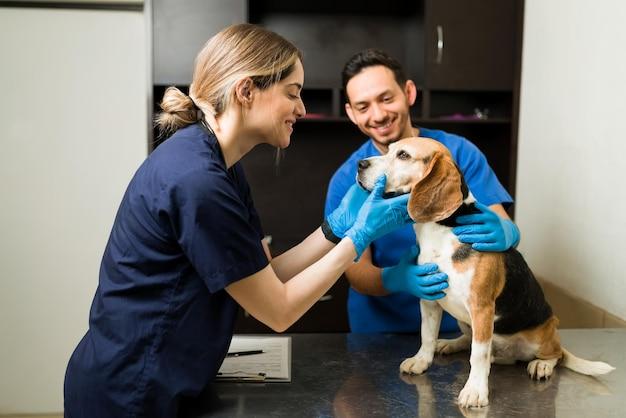Are you an animal lover who dreams of working with furry friends every day? Becoming a veterinarian might just be the perfect fit for you! In this blog post, we will dive into the exciting world of veterinary medicine and explore the pros and cons of embarking on this rewarding career path.
From understanding the daily responsibilities of a veterinarian to shedding light on the differences between a VMD and a DVM, we will cover it all. We’ll also address common questions like the average work hours, financial prospects, and the duration of education needed to become a veterinarian. Additionally, we’ll explore whether it’s harder to become a vet than a doctor, the historical significance of veterinarians, and the various roles they perform beyond surgery.
Curious about the pros and cons? We’ll explore the immensely fulfilling aspects of caring for animals, the opportunities for specialization, and the joy of making a difference in their lives. Conversely, we will also address the challenges veterinarians face, including long hours, emotional strain, and the difficult task of dealing with end-of-life situations.
So, if you’re considering a career as a veterinarian, buckle up and join us on this informative journey! Let’s delve into the fascinating world of veterinary medicine, weighing its advantages and disadvantages in order to help you make an informed decision.

What are the Pros and Cons of Becoming a Veterinarian?
Pros
1. Fulfilling and Rewarding Career Path
Becoming a veterinarian offers a unique opportunity to make a positive impact on the lives of animals and their owners. The joy of helping a sick or injured animal recover, and the gratitude received from their owners, can be incredibly fulfilling. Few professions can match the satisfaction of knowing you played a crucial role in saving an animal’s life.
2. Diverse Range of Specializations
Veterinary medicine provides a wide array of specializations to suit individual interests. Whether you’re passionate about working with small domestic pets, wildlife, farm animals, or even exotic species, there’s a veterinary field for you. This versatility allows for continuous learning and a diverse career path.
3. Job Stability and Prospects
Animals will always need medical care, which provides veterinarians with a stable job market. The demand for qualified veterinarians continues to grow, ensuring good employment prospects and job security. Furthermore, the potential for advancement is significant, with opportunities to become a specialist, researcher, or even a professor in veterinary academia.
4. Financial Rewards
While money shouldn’t be the sole motivator for entering the field, veterinarians can earn a comfortable living. The average annual salary for veterinarians in the United States in 2023 is around $100,000, with the potential for higher earnings in specialized areas. This allows veterinarians to maintain a decent standard of living and pursue a fulfilling personal life.
Cons
1. Emotional Challenges
Working as a veterinarian can present emotional challenges, particularly when dealing with animals in pain or facing end-of-life situations. It can be heartbreaking to witness suffering, and the emotional toll can be draining. Veterinarians must develop coping mechanisms and self-care strategies to navigate these difficult moments.
2. Long and Irregular Hours
Veterinary medicine often requires long and irregular working hours. Emergencies can happen at any time, meaning veterinarians must be available to provide care round the clock. This can lead to a challenging work-life balance, making it important to prioritize self-care and find ways to recharge outside of work.
3. High Educational and Financial Investment
Becoming a veterinarian involves years of education and training, which can be both mentally demanding and financially burdensome. Students must complete a Doctor of Veterinary Medicine (DVM) degree, which typically takes four years to complete after obtaining a bachelor’s degree. Tuition fees and living expenses during this period can accumulate significant debt, which may take years to repay.
4. Physical Demands
Veterinary medicine is physically demanding, requiring veterinarians to handle animals of varying sizes and conditions. This can result in frequent bending, lifting, and standing for long periods. Additionally, veterinarians may also be exposed to potential health risks, such as zoonotic diseases. It’s vital for veterinarians to prioritize their physical well-being and take necessary precautions.
In conclusion, becoming a veterinarian offers numerous pros, including the satisfaction of helping animals, a variety of specializations, job stability, and the potential for financial rewards. However, it comes with its fair share of challenges, such as emotional difficulties, long and irregular hours, high educational and financial investment, and physical demands. Ultimately, it’s a personal decision that requires careful consideration of both the rewards and sacrifices inherent in this noble profession.

FAQ: What are the Pros and Cons of Becoming a Veterinarian?
What does a vet do every day
Veterinarians have a furry-filled day-to-day routine! They provide medical care to animals, diagnose illnesses, administer vaccines, perform surgeries, and offer wellness advice to pet parents. Oh, and they also get plenty of slobbery kisses and tail wags!
How many hours do vets work a day
Vets work hard, but they know how to balance their life with their furry patients. On an average day, you’ll find them clocking in around 8 to 10 hours. This ensures they have enough time to handle emergencies, snuggle with their own pets, and catch up on those adorable animal videos.
What is the difference between a VMD and a DVM
You may have heard these acronyms thrown around, and you might be wondering, “What’s the difference, doc?” Well, worry not! The only distinction is in the title. A VMD (Veterinariae Medicinae Doctoris) is a professional degree recognized in some Ivy League universities, while a DVM (Doctor of Veterinary Medicine) is the more common degree offered in the United States. Either way, they are equally qualified to care for our furry friends!
How much money do you get to be a vet
Ah, the financial side of things! While it’s true that being a vet requires years of study and dedication, it also comes with a decent paycheck. On average, a veterinarian can expect to earn around $95,460 per year. Not too shabby for someone who gets to play with adorable animals all day, right?
How many years does it take to become a veterinarian
Becoming a veterinarian is no walk in the dog park. It typically takes around 8 years of education to earn that prestigious title. This includes 4 years of undergraduate study, followed by another 4 years at a veterinary school. So, lace up those studying boots and get ready for an educational journey!
What is a dog doctor called
Ah, the canine version of a doctor! They go by the name of “veterinarian” or “vet” for short. These incredible professionals are trained to diagnose and treat all sorts of ailments that can affect our furry best friends. So, the next time your pup needs medical attention, you know who to call!
Is it harder to become a vet than a doctor
Well, becoming either a vet or a doctor requires dedication, effort, and a love for helping others. Though the journey may be different, it’s not fair to say one is harder than the other. So, whether your calling is to save lives on two legs or four, both professions demand hard work and a passion for healing.
Who is the father of veterinary
Dr. Claude Bourgelat, a Frenchman born way back in 1712, is known as the “Father of Veterinary Medicine.” He played an instrumental role in advancing veterinary science and developing formal education for veterinarians. We owe a lot to him in our quest to keep our furry companions healthy and happy!
Are vets tough
Absolutely! Vets possess incredible resilience and strength. They handle tough medical cases, perform surgeries with steady hands, and offer comfort to distraught pet parents. They may be superheroes in scrubs, but they also have a heart of gold when it comes to their four-legged patients.
Can you be a vet without doing surgery
Of course! Being a veterinarian doesn’t always mean you have to be a scalpel-wielding surgeon. There are various paths within veterinary medicine, such as focusing on preventive care, diagnostics, research, or even holistic treatments. So, if surgery isn’t your thing, fret not! There are plenty of other wagging tails awaiting your skills.
What to study to become a veterinary doctor
To embark on the journey of becoming a veterinary doctor, it’s important to have a solid foundation in science. You’ll need to study subjects like biology, chemistry, physics, and math during your undergraduate years. And once you reach veterinary school, you’ll dive deeper into topics such as animal anatomy, physiology, pharmacology, and more. So, grab your lab coat and get ready for some serious scientific exploration!
Is it worth being a veterinarian
Absolutely paws-itive! Being a veterinarian is a rewarding career filled with wagging tails, purrs of gratitude, and heartfelt moments with both animals and their loving owners. The ability to contribute to the well-being of animals and play a crucial role in their health makes it more than worth it. Plus, who can resist those adorable puppy dog eyes?
What do veterinarians do with dead animals
When we part ways with our beloved furry companions, veterinarians ensure their final journey is handled with respect and dignity. They may offer options such as cremation or burial, and some even provide grief counseling to help pet parents cope with the loss. Remember, our four-legged friends hold a special place in our hearts, even after they cross the rainbow bridge.
And there you have it! A comprehensive FAQ on the pros and cons of becoming a veterinarian. Now you’re armed with the knowledge to pursue a career full of furry friends, snuggles, and endless amounts of unconditional love. So, go forth and make the animal kingdom proud!
